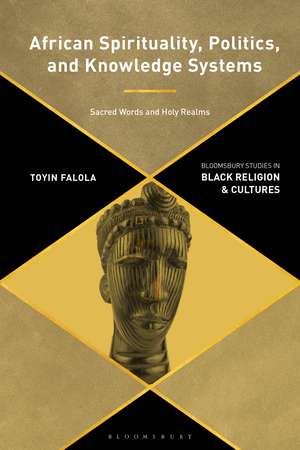African Spirituality, Politics, and Knowledge Systems: Sacred Words and Holy Realms: Bloomsbury Studies in Black Religion and Cultures
Autor Dr. Toyin Falolaen Limba Engleză Paperback – 20 sep 2023
| Toate formatele și edițiile | Preț | Express |
|---|---|---|
| Paperback (1) | 192.99 lei 6-8 săpt. | |
| Bloomsbury Publishing – 20 sep 2023 | 192.99 lei 6-8 săpt. | |
| Hardback (1) | 541.28 lei 6-8 săpt. | |
| Bloomsbury Publishing – 6 apr 2022 | 541.28 lei 6-8 săpt. |
Preț: 192.99 lei
Preț vechi: 250.26 lei
-23% Nou
Puncte Express: 289
Preț estimativ în valută:
36.93€ • 38.34$ • 30.80£
36.93€ • 38.34$ • 30.80£
Carte tipărită la comandă
Livrare economică 22 martie-05 aprilie
Preluare comenzi: 021 569.72.76
Specificații
ISBN-13: 9781350271982
ISBN-10: 1350271985
Pagini: 304
Dimensiuni: 156 x 234 x 25 mm
Greutate: 0.42 kg
Editura: Bloomsbury Publishing
Colecția Bloomsbury Academic
Seria Bloomsbury Studies in Black Religion and Cultures
Locul publicării:London, United Kingdom
ISBN-10: 1350271985
Pagini: 304
Dimensiuni: 156 x 234 x 25 mm
Greutate: 0.42 kg
Editura: Bloomsbury Publishing
Colecția Bloomsbury Academic
Seria Bloomsbury Studies in Black Religion and Cultures
Locul publicării:London, United Kingdom
Caracteristici
Offers in-depth knowledge of the prevailing circumstances that engender certain religious practices in Africa
Notă biografică
Toyin Falola is a University Distinguished Teaching Professor of History and the Jacob and Frances Sanger Mossiker Chair in the Humanities at the University of Texas at Austin, USA. He has served as the General Secretary of the Historical Society of Nigeria, the President of the African Studies Association, Vice-President of UNESCO Slave Route Project, and the Kluge Chair of the Countries and Cultures of the South, Library of Congress. He is a member of the Scholars' Council, Kluge Center, and the Library of Congress. He has received over 30 lifetime career awards and 14 honorary doctorates.
Cuprins
PrefaceAcknowledgmentsNotes on SourcesIntroduction: Sacred Words and RealmsPART I. Indigenous Systems1. Diviners and Indigenous Knowledge2. Shamanism as a Knowledge System3. Magic and WitchcraftPART II. Islam 4. Sufism as a Knowledge System5. Political and Intellectual Thoughts of Usman Dan Fodio6. Shaykh Ahmadu Bamba and the Muridiyya Sufi OrderPART III. Christianity 7. Missionaries and Knowledge Production8. Pentecostalism: Philosophies and Prractices9. African Spiritual ChurchesConclusionNotesBibliography Index
Recenzii
This book is an excellent resource on how religious practices and beliefs engender knowledge systems in Africa. Toyin Falola makes the crucial point that we cannot adequately comprehend contemporary African politics and socio-economic events if we do not understand the continent's history of religion and religious production of knowledge. The book's magisterial sweep and comprehensive coverage of the religions and religion-based knowledge systems in Africa are remarkable. The author delivers his findings, analyses, and historical details in very accessible prose.
Toyin Falola's success in delineating the intersections between 'sacred' text and 'profane' politics once more confirms his attested commitment to African epistemic liberation. This will engender a new engagement among scholars in regard to secular knowledge as derived from African and Africanized religions. We shall long be in his debt.
African Spirituality, Politics and Knowledge Systems is thoroughly researched, logical in argument progression, and deeply engaging in its clear narrative. This is a book of lasting value and relevance to those interested in religions in Africa.
Toyin Falola's success in delineating the intersections between 'sacred' text and 'profane' politics once more confirms his attested commitment to African epistemic liberation. This will engender a new engagement among scholars in regard to secular knowledge as derived from African and Africanized religions. We shall long be in his debt.
African Spirituality, Politics and Knowledge Systems is thoroughly researched, logical in argument progression, and deeply engaging in its clear narrative. This is a book of lasting value and relevance to those interested in religions in Africa.










